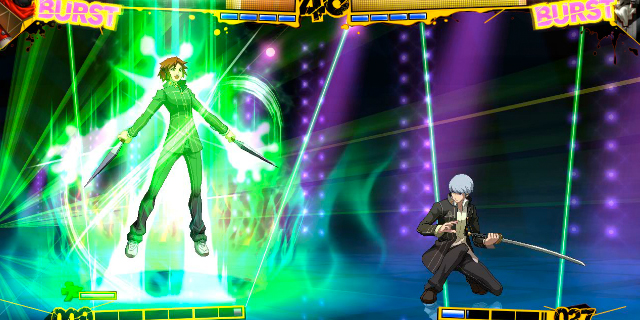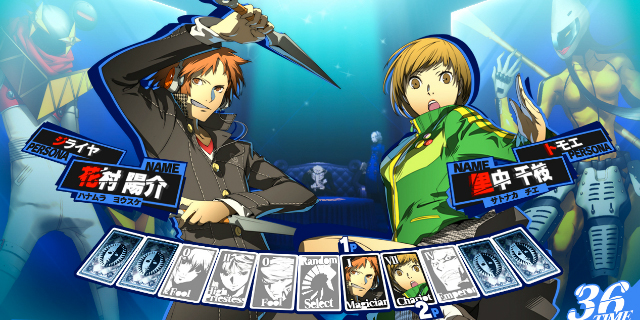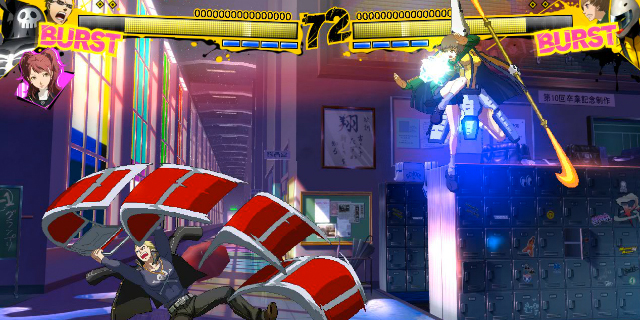
I’ll admit: when the announcement of Persona 4 getting a fighting game happened, I flipped out in happiness. One of my favorite RPGs being translated into a fighter? That sounded pretty awesome. Or at least in my head, anyway. I was legitimately excited for this game to make its way to a Western audience.
But then I thought to myself, the last time I ever saw RPG characters inside a fighting game was back in the PlayStation era with Ehrgeiz. Even then, it was a lackluster fighter, featuring Cloud, Tifa and Sephiroth from Final Fantasy VII. Given the track record of RPG characters in fighters, how would Persona 4, a full-length RPG, translate their characters into a fighting game series?
Luckily, they found the right people to do it. Considering Arc System Works’ experience with the Guilty Gear and BlazBlue games, the Persona 4 series was in good hands.

Typically, fighting game story modes don’t amount to much. It’s usually some disjointed story with each character in their own individual setting, with only certain characters coming together and making a cohesive story to bring into the next game. Persona 4 Arena manages to take this mode to a completely different level. Two months after the events of the RPG, Yu (the nameless protagonist from the series) has gone back to the city and started living with his parents again, but is returning to Inaba for Golden Week to hang out with his friends. After the local cast start hearing rumors of the Midnight Channel returning, they decide to see what’s going on and see if they’re true. They soon discover that they’re involved with something called the P-1 Grand Prix. It’s a mystery for the cast on what’s going on and why this is happening again. Once again, they have to return to the TV World that they had hoped was done with.
While everyone from the Persona 4 cast makes a return appearance, several members of the Persona 3 cast show up as well, including Akihiko, Mitsuru, Aigas and Elizabeth, each with their own reasons for being involved in the story.

Unlike the BlazBlue series, the Story Mode battles in this aren’t nearly as frequent. The P4A story plays out more like a visual novel. At times you could go a half-hour without getting into a battle, and even then, all the battles are one-round matches. Fortunately, the story is absolutely superb and has fully-voiced dialogue scenes (with your choice of English or Japanese voice). It’s particularly helpful for those who just want to see the story and not have to experience any difficult battles.
Speaking of difficult battles, the challenge of the game comes from the game’s score attack mode with added gimmicks to the characters (like Yosuke having infinite speed boost), and its network mode, which allows you to face other P4A players online. One of the biggest concerns about this game was how the online would play, and they deliver an almost lagless experience whether or not your opponent has a great connection against you. The custom match function has a lot of search options that allow you to find the perfect opponent as well.
What makes this game stand out particularly, aside from its great music and amazing graphics, is how simple this game is. It’s a four-button fighter (two physical attacks and two Persona attacks), and most are either executed with a singular direction or a quarter-circle command (either Down, Down-Forward, Forward or Down, Down-Back, Back). Amazingly enough, the characters have enough commands and attacks to be different enough, but still be simple enough for anyone to pick up. In addition, each character has an Instant Kill move that will… well, instantly kill the opponent if the attack hits.
The game has a challenge mode as well, that allows you to learn a characters moveset as well as learn different combos that they’re capable of. It definitely helps in the learning process of the game. It helps with timing combos as well as execution of certain attacks.
But what else could I possibly say about this game? The game has amazing graphics and music, game mechanics simple enough for anyone to pick up and enough depth to rank up there with the more technical games out there, and it has an amazing online mode that Capcom and other companies could learn from. If you’re a fan of the BlazBlue or Guilty Gear series, or a fan of the Persona 4 series and want to get into fighters, Persona 4 Arena is definitely something you should play.
Pros: Great graphics, great music, great voice overwork, amazing netcode
Cons: Battles could happen a little more frequently in the story mode



















